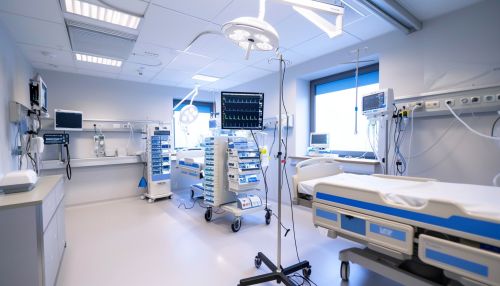Healthcare Technology
Introduction
Healthcare technology refers to the use of organized knowledge and skills in the form of devices, medicines, vaccines, procedures and systems developed to solve a health problem and improve quality of lives. This field intersects with multiple areas, including biotechnology, pharmacology, information technology, and biomedical engineering.


History of Healthcare Technology
The history of healthcare technology dates back to the prehistoric times with the use of herbs and other natural remedies. The discovery of microbiology and the development of antibiotics in the 20th century revolutionized healthcare, leading to significant improvements in patient care and life expectancy.
Types of Healthcare Technology
Healthcare technology can be divided into several categories, each with its own unique focus and applications.
Medical Devices
Medical devices are instruments, apparatus, machines or software used in the prevention, diagnosis or treatment of illness or disease, or for detecting, measuring, restoring, correcting or modifying the structure or function of the body for some health purpose. Examples include pacemakers, MRI machines, and surgical robots.
Pharmaceuticals
Pharmaceuticals are medicinal drugs used in health care. They include both prescription and over-the-counter drugs, and cover a wide range of therapies, from pain relief to the treatment of chronic conditions such as diabetes or heart disease.
Health Information Technology
Health information technology (HIT) involves the processing, storage, and exchange of health information in an electronic format. It encompasses a wide range of products, from electronic health records (EHRs) to telemedicine and mobile health apps.
Biotechnology
Biotechnology in healthcare involves the use of living organisms, or derivatives thereof, to make or modify products for the prevention, diagnosis or treatment of disease. This includes the development of genetic engineering techniques and stem cell therapies.
Impact of Healthcare Technology
Healthcare technology has a profound impact on society, affecting everything from the way diseases are diagnosed to how patients are treated and how information is shared.
Improved Patient Care
Healthcare technology has led to significant improvements in patient care. For example, the use of electronic health records has improved the accuracy and accessibility of patient information, leading to more informed decision-making by healthcare providers.
Increased Efficiency
Healthcare technology has also increased efficiency within the healthcare system. For example, telemedicine allows patients to consult with their doctors remotely, reducing the need for hospital visits and freeing up resources for more critical cases.
Enhanced Research and Development
Healthcare technology has enhanced research and development in the medical field. For example, advancements in biotechnology have led to the development of new treatments and therapies for a wide range of diseases.
Future of Healthcare Technology
The future of healthcare technology is promising, with many exciting developments on the horizon. These include advancements in artificial intelligence, robotics, and precision medicine, all of which have the potential to further revolutionize healthcare.
